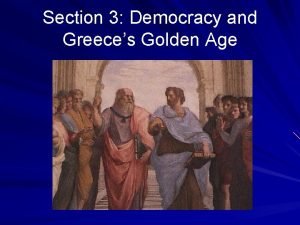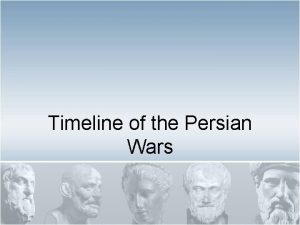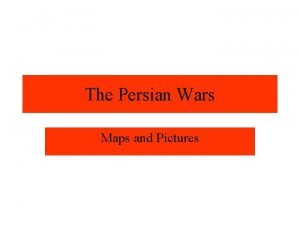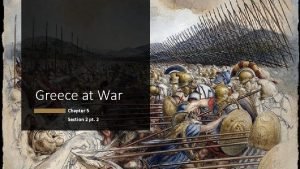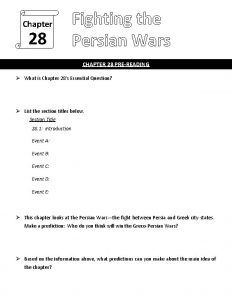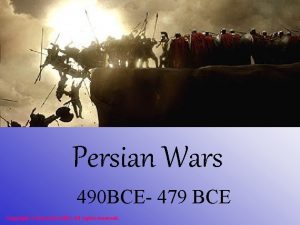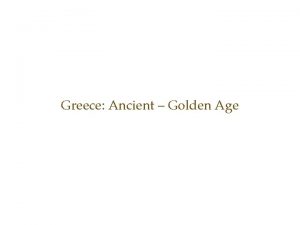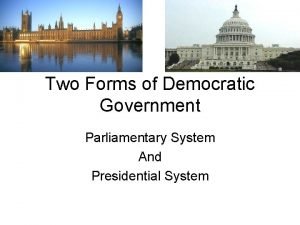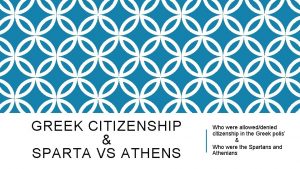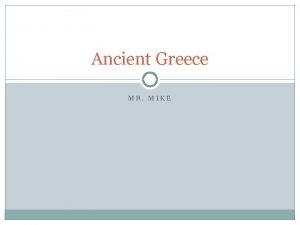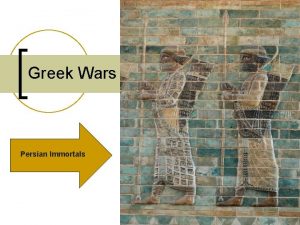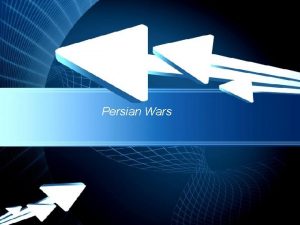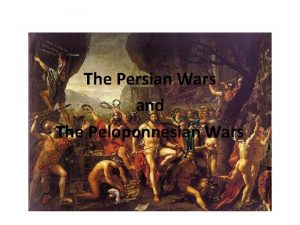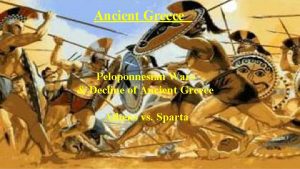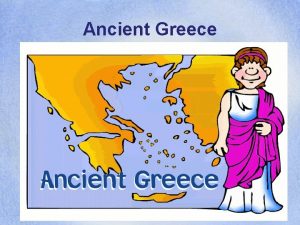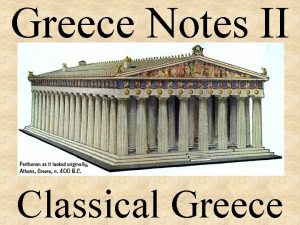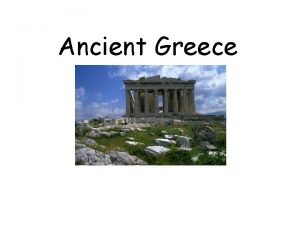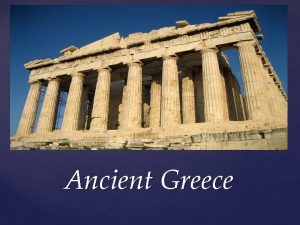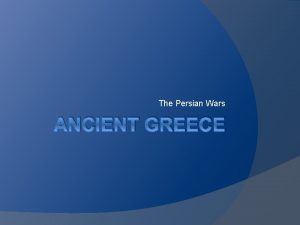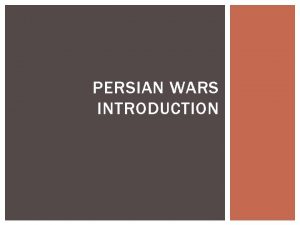Ancient Greece The Persian Wars Democracy and Golden













- Slides: 13

Ancient Greece The Persian Wars Democracy and Golden Age Peloponnesian War Alexander and Hellenistic Culture

Persian wars A New Kind of Army Emerges • Cheaper iron replaces bronze, making arms and armor cheaper • Leads to new kind of army; includes soldiers from all classes • Phalanx —feared by all, formation of soldiers with spears, shields

Battle at Marathon • Persian Wars —between Greece and Persian • Persian army attacks Athens, is defeated at Empire—begin in Ionia Marathon in 490 BCE Pheidippides Brings News • Runner Pheidippides races to Athens to announce Greek victory Thermopylae and Salamis • In 480 BCE Persians launch new invasion of Greece • Greeks are divided; many stay neutral or side with Persians

• • Greek forces hold Thermopylae for three days before retreating Athenians defeat Persians at sea, near island of Salamis Victories at Salamis and Plataea force Persian retreat Many city-states form Delian League and continue to fight Persians Consequences of the Persian Wars • • • New self-confidence in Greece due to victory Athens emerges as leader of Delian League Athens controls the league by using force against opponents League members essentially become provinces of Athenian empire Stage is set for a dazzling burst of creativity in Athens

Democracy and Golden Age Pericles as Leader • Skillful politician, inspiring speaker, respected general • Dominates life in Athens from 461 to 429 BCE Stronger Democracy • Pericles hires more public officials; creates direct democracy • Direct democracy —citizens rule directly, not through representatives

Athenian Empire • Takes over Delian League; uses money to strengthen Athenian fleet • Sparta and other cities resent Athenian power • Pericles buys gold, ivory, marble; hires artisans to beautify Athens Architecture and Sculpture • • Pericles builds the Parthenon—a large temple to honor goddess Athena Within temple, sculptor Phidias crafts 30 -foot statue of Athena Sculptors create graceful, strong, perfectly formed figures Classical art —values harmony, order, balance, proportion, beauty

Peloponnesian War • 431 B. C. city-states Sparta and Athens at war • Sparta has better army, Athens has better navy • Plague strikes Athens in 430 BCE , kills many—including Pericles • Sparta and Athens sign truce in 421 BCE • 415 BCE Athens renews war, attacks Syracuse; is defeated in 413 BCE • Athens and allies surrender to Sparta in 404 BCE.

Alexander and Hellenistic Culture • • • Macedonia —kingdom of mountain villages north of Greece King Philip II—ruler, brilliant general; dreams of controlling Greece Macedonians call themselves Greek; rest of Greece does not Philip creates well-trained professional army; plans to invade Greece 338 BCE Macedonians defeat Greece; 336 BCE King Philip murdered His son named king of Macedonia—becomes Alexander the Great

Invasion of Persia • 334 BCE Alexander invades Persia; quick victory at Granicus River • Darius III—king of Persia, assembles army of 50, 000– 75, 000 men • Alexander defeats Persians again , forces King of Persia to flee • Alexander marches into Egypt, crowned pharaoh in 332 BCE • Conquers the rest of Mesopotamia and other cities

Alexander in India • Alexander fights his way across the deserts of Central Asia to India • Alexander conquers Indus Valley area in 326 BCE • Reluctantly returns to Babylon, dies in 323 BCE Alexander’s Legacy • Alexander melds Greek and Persian cultures; wife is Persian • Empire becomes three kingdoms: (1) Macedonia, Greek city-states (2) Egypt (3) old Persia, also known as Seleucid kingdom

Spread of Hellenistic Culture • Result of Alexander’s policies—a new vibrant culture • Hellenistic culture —Greek blended with Egyptian, Persian, Indian • Alexandria —Egyptian city becomes center of Hellenistic civilization Alexandria’s Attractions • Lighthouse , called the Pharos, stands over 350 feet tall • Museum contains art galleries, a zoo, botanical gardens, dining hall • Library holds masterpieces of ancient literature; supports scholars

• Scholars preserve Greek and Egyptian learning in the sciences • Astronomer Aristarchus proves sun is larger than Earth • Proposes planets revolve around sun ; not accepted for 14 centuries • Eratosthenes uses geometry to calculate Earth’s circumference • Euclid —mathematician; Elements the basis for courses in geometry • Archimedes —scientist; ideas help build force pump and steam engine

• Zeno founds Stoic school; promoted virtuous, simple lives • Epicurus believes people should focus on what senses perceive • Colossus of Rhodes —Hellenistic bronze sculpture over 100 feet tall • Sculptors move to non-classical, natural forms; real people
 Democracy and greece's golden age
Democracy and greece's golden age Persian wars end
Persian wars end Persian wars timeline
Persian wars timeline Ionian revolt timeline
Ionian revolt timeline Persian war map
Persian war map Persian wars timeline
Persian wars timeline Define persian wars
Define persian wars Persian wars definition
Persian wars definition Persian wars
Persian wars Describe two effects of the persian wars
Describe two effects of the persian wars Persian wars cause
Persian wars cause Persian empire golden age
Persian empire golden age Presidential system of government
Presidential system of government Where was sparta located
Where was sparta located
